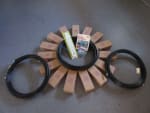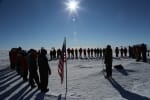Chairs and sofas (and mattresses!) have been set up in the gym, all for the sake of movie-watching comfort. It’s unclear how they vied for best seats. But some padding or support is imperative when you’re going to hunker down for three movies in a row—or rather, three versions of the same movie. Yes, we’re talking about The Thing, the traditional entertainment springboard to ring in the beginning of the winter season at the South Pole. […]
News
Week 6 at the Pole
A cloud of snow dust appears in the wake of the last flight out of the South Pole for the season. Well…almost. It was supposed to be the last flight, but unforeseen circumstances (they do crop up every so often) caused a few summer personnel to delay their departure a few more days. Delays can be a nuisance, but so close to the end of the summer season, they’re even more likely to produce anxiety since in winter there’s no leaving the Pole once the last flight has gone. […]
Week 5 at the Pole
Maybe we should all do this with our packages from now on. Mail and cargo arrived last week, and someone set out the contents of one of the boxes quite decoratively for the photo. To efficiently unload the goods when they arrived, they formed an assembly line going up the stairs to the station. […]
A search for neutrinos in coincidence with the first gravitational wave event
The detection of the first gravitational wave (GW) event by LIGO represents one of the greatest scientific breakthroughs of recent years. After receiving the gravitational wave alert in September 2015 from the Advanced LIGO detector, the IceCube and ANTARES neutrino telescopes analyzed the data they had recorded at the same time in order to search for neutrinos that might have been emitted from the same event. Neither search identified any neutrinos that could be associated with the burst. These results set the first limits on neutrino emission from a GW transient event. […]
Week 4 at the Pole
Last week, the South Pole traverse finished unloading the supply of fuel it had brought, transferring it all to the tanks on station. They should be all set for winter, which is long at the South Pole and is fast approaching. […]
Week 3 at the Pole
When traveling to the South Pole, you have to be prepared for delays. But last week it was the station, not the travelers, that was not quite prepared—with a summer population close to its limits, it had to creatively house dozens of passengers left behind from departing planes that boomeranged. […]
Week 2 at the Pole
Four new arrivals reported to the South Pole ready for duty after experiencing considerable travel delays. They donned their white lab coats and got to work, performing test runs and installing cabling (looks like fun!)—and they even fit in some time to join a scheduled outreach webcast to talk about their work and travels. […]
Further limits on the GRB contribution to astrophysical neutrinos and ultra-high-energy cosmic rays
Today, the IceCube Collaboration announces a new search for neutrino emission from GRBs with a first-ever search that covers all flavors and the full sky. Five events were found to have a low-significance correlation with five GRBs. Consequently, the analysis places tight constraints on current models of neutrino and ultra-high-energy cosmic ray (UHECR) production in GRBs. These results have just been submitted to The Astrophysical Journal. […]
Week 1 at the Pole
Now you see it, now you don’t. These images show the spot of the geographical South Pole, just before and after the old marker was removed. At the beginning of each year, a new marker is situated at the current location, which shifts constantly due to the movement of the ice sheet. […]
Week 52 at the Pole
Every New Year’s Day, they have a celebration at the Pole in which they plant a newly designed marker for the location of the ever-shifting geographic pole. The spot is repositioned annually due to movement of the polar ice sheet at about 10 meters per year. […]









